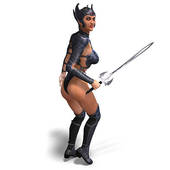 We've all heard about the 'superstars' (known as 'outliers' in the publishing industry) in the new and ever evolving self-publishing world (those with sales in the hundreds of thousands for a single month) ... you know, Amanda Hocking, Joe Konrath, John Locke, etc.
We've all heard about the 'superstars' (known as 'outliers' in the publishing industry) in the new and ever evolving self-publishing world (those with sales in the hundreds of thousands for a single month) ... you know, Amanda Hocking, Joe Konrath, John Locke, etc.BUT, there are quite a number of self-publishers that are making a living selling anywhere from 800 to 20,000 e-books per month.
Details discussed in Publishing Perspectives by Robin Sullivan:
The New Midlist: Self-published E-book Authors Who Earn a Living
There have been many articles about self-published superstars like Amanda Hocking, Joe Konrath, and John Locke. While these success stories are noteworthy, we should look at them for what they are — outliers in the self-publishing world just as Stephen King and Stephenie Meyer are outliers in the big-six publishing industry. Most authors can never hope to reach sales in the hundreds of thousands for a single month, but there are more than a few who sell anywhere from 800 to 20,000. While selling books at this level would seem extraordinary by traditional publishing standards, the mere fact that so many self published authors have achieved this goal (with more being added each month), indicates that it is not an unusual occurrence.
Not only are these new mid-listers selling a lot of books, but they are also receiving significantly more money from each sale (the industry standard is a 25% royalty of net sales for e-books under contract by a big-six publisher). If a self-published author sells their book for $2.99 – $9.99, then Amazon will pay 70% ($2.09 – $6.99). Compare this to the $1.22 per book income (which needs to be shared with an agent) for a $6.99 e-book sold through a publisher. High volume combined with good revenue is providing self-published e-book authors five and six figure yearly incomes allowing them to quit their “day jobs” and make a living by doing what they love most–writing.
The Tipping Point
I regularly give lectures on the different options for publishing and up until recently my main point about self-publishing was the unprecedented control it provided. Recently I’ve had to change my presentations to also acknowledge that if you wish to maximize income then self-publishing, if done well, could provide the best revenue potential. A year ago I was definitely not making that statement — but a watershed moment occurred in October/November 2010. It was at this time that sales of e-books from previously unknown authors skyrocketed.Read and learn more
This blog available on Kindle here


